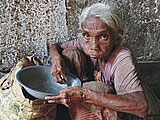Fighting Rural Poverty Through Fair Trade
By Ruediger Meyer for ISN
The increase in food prices coupled with the financial crisis has reversed the achievements of poverty alleviation programs in many developing countries in Africa and Asia.
As a result of the food price hike and the financial crisis, the world’s poor have been affected not only by financial poverty but also social and resource poverty. Armed conflicts raging across the globe have exacerbated the plight of the poor, especially farmers and wage workers
Estimates by researchers indicate that the financial crisis has added 53 million people to the 2009 count of those living on less than $1.25 a day, and based on growth projections for 2010 this number is likely to swell to an extra 73 million people, with 91 million more living on less than $2 a day by 2010.
Development has become the biggest casualty of the economic meltdown. Rural communities in Asia and Africa will now have to forego access to social security, health, education, markets, credits and other facilities for a much longer period than expected.
It is time to rethink our goal, redesign our strategies and rebuild the confidence of the poor in the institutions charged with alleviating poverty and implementing development programs.
Strategies to deal with financial poverty alone will not make a difference. There is an urgent need to implement strategies to tackle social poverty. For sustainable development we need to build infrastructure to help the poor reach the market with their produce, provide them with education, health and credit facilities.
Liberalized trade alone is not the solution to the problem of rural poverty; over the years it has not changed the lives of the millions of poor. In fact, their number has swelled and will continue to do so until we reform the trading system to make it more equitable.
The biggest hurdle is a lack economic opportunities.
A 2000 World Trade Organization study noted that trade alone may not be enough to eradicate poverty, but it is essential if poor people are to have any hope of a bright future.
The farming community in the developing countries that feed the world deserves preferential treatment and support from the international market. Fair trade combined with free trade can make a huge difference to the lives of millions of farmers and wage workers in Africa, Asia and Latin America.
Improved market opportunities for the small-scale farm sector will help farmers to contribute to their own development.
The International Assessment of Agricultural Knowledge, Science and Technology for Development (IAASTD) recommends in its report “Business as Usual is Not an Option” that alternative trading channels be promoted, trade barriers for products in which developing countries have a comparative advantage be removed, and deeper preferential access to markets be provided to least developed countries.
The IAASTD holds the view that supporting the development of certified organic agriculture and fair trade to offer alternative trading channels to mainstream commodity markets can help improve the social and environmental performance of agriculture, and provide more favorable and stable returns to farmers and agricultural workers.
Indeed, there is merit in this, and studies conducted by various universities have amply demonstrated the positive impact of fair trade on the lives of the poor farmers.
Policymakers and economists should focus on evolving a trading system based on the principles of fair trade that shields farmers from massive price fluctuations and provides them with a social premium to achieve their development aspirations.
Farmers in Asia, Africa and Latin America have managed to alleviate their social and economic poverty by constructing hospitals, schools and communication facilities for their communities with the support of international development organizations that helped them get a fair deal and built their capacity to reach the markets.
Rural poverty can be challenged by offering fair opportunities to farming communities, allowing them to trade freely in the global economy dotted with tariff barriers – something to consider at the upcoming Davos World Economic Forum.

